Retired family physician Dewayne Nash spoke about life after an early diagnosis of Alzheimer's, his involvement as a subject in research including the clinical trial of the Alzheimer's drug Aduhelm, and his take on the FDA's controversial approval of Aduhelm.
With a strong family history of Alzheimer’s, Dewayne Nash had expected that he would start experiencing symptoms of the disease by the time he reached his 70s or 80s. But his memory problems set in earlier than he had expected. At the age of 60, Nash was diagnosed with mild cognitive impairment (MCI), accelerating his retirement from practicing as a longtime family physician, a career that he has dreamt of pursuing ever since he was in middle school.
Nonetheless, an early diagnosis has enabled Nash to not only plan ahead and take care of his own health, but also to take part in the clinical trial of Aduhelm, the Alzheimer’s drug that was recently approved by the Food and Drug Administration.
In a wide-ranging interview, Being Patient spoke with Nash about his transition from being a clinician to retirement after his diagnosis of MCI in 2010, which he later found out was caused by Alzheimer’s, his experience participating in Aduhelm’s clinical trial, and tidbits of advice for clinicians, patients with Alzheimer’s and their caregivers.
On Nash’s MCI diagnosis and retirement:
Being Patient: You were first diagnosed with mild cognitive impairment in 2010, and further testing later on confirmed that it was MCI due to Alzheimer’s. What were the earliest symptoms of the disease that you experienced?
Dewayne Nash: My case is a little different because I was accidentally diagnosed. At the time I was diagnosed, I really didn’t feel like I was having any symptoms. I volunteered to be in the normal control group of the Alzheimer’s Disease Neuroimaging Initiative (ADNI) study. The neuropsychological exam was about a two-hour exam. Some things I noticed was that when they gave me 10 words to remember, I’d repeat them and I could only get five of them right. That was disturbing. About two years before, when I applied for long-term care insurance, I got all 10 words right.
Then they started flashing pictures of different objects. There are probably 20 things that we all should recognize. There were five pictures that I was totally blocked on. I couldn’t recognize the pictures. Then there were spatial exams where you had to draw complicated diagrams. I had difficulty doing that. There were little blocks and you had to make designs with them. I had difficulty doing those. I can remember looking out, cold and sweaty, because that was the moment I knew I had a memory issue.
Did I recognize anything [before]? No. I’ve talked to my nurses, patients and family, and no one really noticed anything. Looking back, there were some things that I didn’t remember about patients and I didn’t think much about it at the time. I had some difficulties doing my last CME — continuing medical education — course online. I scored real bad and I barely passed. I usually got a higher score.
Being Patient: What motivated you to enroll in ADNI in the first place?
Dewayne Nash: The reason I entered that study was because of my strong family history [of Alzheimer’s] and I decided when I reached 60, I wanted to be monitored on a regular basis.
Being Patient: Can you tell us more about your family history of Alzheimer’s and whether you ever expected that you would also be diagnosed with the disease eventually?
Dewayne Nash: I really figured I would. One of my horrors is that it would sneak up on me and I wouldn’t be aware of it, that I would start making mistakes and not realize it.
I was expecting [to start experiencing Alzheimer’s symptoms in] my 70s or 80s. However, my younger brother — he died eight years ago and yesterday (Aug. 8) was the anniversary — was a year younger than me. We were like twins growing up. He was diagnosed at 55 and died in the final stages at 63. My mother was diagnosed and she died a few years before I was diagnosed. That was in the back of my mind all the time.
Being Patient: You expected that you would develop Alzheimer’s at some point, but it happened earlier than you had expected. Your MCI diagnosis accelerated your retirement plans. What was the transition from work to retirement like?
Dewayne Nash: The day [clinicians from ADNI] did the memory testing on me, I knew I had [Alzheimer’s]. It took three weeks to get the report, so that gave me a month to prepare. For that month, I refilled people’s prescriptions into the future. I had kids come in for their well check-ups, physicals, re-checks, things like that. I started shifting people away [to other doctors].
There’s a story, and I usually cry when I tell these stories so bear with me: At five o’clock, the night before I saw the neurologist, one of the nurse’s sons was due for a two-year check-up. So at five o’clock when the office was closed, I did the two-year check-up. No one knew I was going to leave [practice]. I was going to [wait for] the final word.
The next day, I saw the neurologist, and she gave me the diagnosis (MCI) and a prescription for Aricept. I knew that there was no way I could be practicing.
When I got home, I called the head of the clinic and told him, ‘I’ve got MCI. It’s probably Alzheimer’s disease and I got put on Aricept. I’m not going to practice anymore.’ So I never returned and I did write a blog that day to my patients. They were referred to my blog. That was very difficult to write. I cried when I wrote it and every year, I look at it again and I cry every time. Since I have retired, I dream about being a physician seeing patients.
Being Patient: How did you manage life after losing the structure of work?
Dewayne Nash: I had planned on retiring at 65 instead of 60. We had moved out into the countryside north of Austin and we had 10 acres [of land]. We had some animals and a big garden and I did a lot of country living type of stuff. That was my project during retirement so I started fencing, roofing and all that kind of stuff. I did most of it myself.
I’d always wanted to volunteer with the Alzheimer’s Association, and Meals on Wheels because my mother got [services from] Meals on Wheels, so I volunteered with them, [and also with] Habitat for Humanity.
“Today, I’m looking forward to doing this talk. Tomorrow,
I’m going to work in the garden. The next day, I’m playing with my
grandkids. I’m staying busy. That’s what you have to do, whether
you’ve got terminal Alzheimer’s disease or terminal cancer or
some other terminal disease: to make the most out of it.”
We traveled and we tried to do two good trips a year. I stayed real busy. I never was on social media at all when I was in practice. Once I retired, I got on social media and I connected with a lot of my patients.
Being Patient: Recently, you wrote in your blog, organicgreendoctor, about how an early diagnosis has helped you plan for your life and take care of your health. Can you share with us more about how an early diagnosis has benefited you?
Dewayne Nash: Some things wake you up. I was always pretty good about taking care of my health, but I got really aggressive with it. I changed my diet, doing the MIND diet, a version of the Mediterranean diet. I’m 90 percent vegetarian.
I hadn’t really been on blood pressure medicine before so my primary care doctor put me on blood pressure medicine and got real aggressive about my cholesterol. I control my weight real well. I stay very active.
Over the last 10 years, I’ve done a lot of Alzheimer’s symposiums, giving talks and been on panels, doing a lot of Q&A sessions.
I also got on Aricept earlier than probably most people. I really think that all this healthy living and Aricept has helped slow my disease down.
The other [reason] I’m glad I know early [about Alzheimer’s] is that it’s made my wife and I be prepared as a couple for when the time comes when I get worse. We’ve seen it with my mother and brother. We’ve seen it with a lot of neighbors and friends. We’ve talked about it and we’ve got our wills, power of attorney, done. She knows that when the time comes, I don’t want extra stuff done to me, and it’s time I want to go.
Probably the biggest benefit of me knowing early is being in the ADNI study, and then getting on the Aduhelm study. It gave me access to a drug that may slow the disease down. I’ve been able to access [the drug] five, six years before others have been able to.
And, I was able to quit practicing before I did harm to anybody.
Being Patient: What are the day-to-day Alzheimer’s symptoms that you experience?
Dewayne Nash: I don’t have any. I’m being honest. I’m 71, so I’m acutely aware if I can’t remember things. I think a lot of what I [experience] is due to my age.
Two, three years after I was diagnosed, there was a period of time when my memory scores dropped off. For the last few years, my memory has been at a normal value when I do the memory test MoCA (Montreal Cognitive Assessment). It was not that way when I was first diagnosed. It was in the MCI range, and it even dropped down for a couple years. Then it started picking back up. Something happened and I don’t know what it was. I attribute it to the Aricept and all the healthy living.
On the ups and downs of being a participant in the clinical trial of Aduhelm, and the FDA’s approval of the drug:
Being Patient: Let’s speak more about your participation in the clinical trial of Aduhelm. How did you decide to join the study?
Dewayne Nash: The ADNI study is all about diagnostic testing. There’s no drug involved. I was in the ADNI study and at the end of the study, I decided that I did my part on diagnostic testing. I’m not getting into another study unless there’s a drug that has the potential to help me.
Being Patient: For a period, you received the placebo in the Aduhelm clinical trial, right?
Dewayne Nash: Yes I did. There’s a placebo group and the real drug group. After 18 months, everybody [was put] on the real drug. I [was on placebo for] 18 months and I knew I was on the real drug for seven months. Then all of a sudden, [Biogen] stopped the study.
“There were only 3,000 of us in
the world with this hope. We’ll all take
some hope over no hope at all.”
Being Patient: You’re referring to when the drugmaker Biogen halted Aduhelm’s Phase 3 clinical trials in 2019 after an analysis showed that it likely wasn’t beneficial for patients. How did you feel when you found out about the decision?
Dewayne Nash: I felt like a horse kicked me in the stomach. I’ve read about other people in the study and everybody used the words ‘devastating’ and ‘getting kicked in the stomach’ because one thing this drug had given us was some hope. There were only 3000 of us in the world with this hope. We’ll all take some hope over no hope at all.
I knew that Aduhelm was my only chance. There wouldn’t be another chance for me. I’m sure the other people realized that too. The next drugs that come are gonna be way too late for them.
It was pretty devastating. But on the other hand, when they reactivated it (the study of Aduhelm), it was the highest I’ve ever been in this whole process. I have my third infusion next week and I’m guaranteed [to get the drug for] two years.
Being Patient: The FDA’s approval of Aduhelm has been extremely controversial. What are your thoughts on the agency’s decision?
Dewayne Nash: I’m glad that they approved it, and I think they should have approved it, but I think they went about it wrong. It just smells bad. They could have waited two or three years [for more research]. My guess is, when this is all said and done, [Aduhelm] is going to slow the decline down by the 20 percent [that Biogen’s] talking about. All this controversy wouldn’t have happened if [the FDA had] just waited.
Being Patient: So you believe that the FDA approved Aduhelm prematurely.
Dewayne Nash: They approved it too soon. Look at all these well-respected neurologists and what they say about it. A lot of them are for it but a lot of them are against it, and that’s a red flag.
Want to learn more about clinical trials
for Alzheimer’s and dementia?
Check out the Lilly Trial Guide.
On advice for clinicians, patients and their caregivers:
Being Patient: Shifting gears away from our discussion about Aduhelm, what would you suggest to clinicians about the best approaches for diagnosing patients with Alzheimer’s?
Dewayne Nash: The number one thing that I would tell physicians is: listen to their patient, because they don’t. I’m on the other side and I go, ‘They’re not listening to me.’
[Patients] used to come [to me] for [issues like] blood pressure and cholesterol. Then at the last minute, they say, ‘I’m having problems with my memory.’
I always encourage people to make an appointment with your doctor just for memory issues, and nothing else. Make sure the doctor listens to you and writes down what your memory issues are. If you’re really having problems, bring someone with you.
If you’re a practicing physician, you should never tell anybody that they have Alzheimer’s disease, unless you’ve done a good diagnostic workup and you’re really sure. In 2021, you should be able to tell someone if they have Alzheimer’s disease or not.
Being Patient: Let’s discuss more about the importance of listening to patients, because people often express the frustration that their clinicians speak to their caregivers, instead of directly to them. Can you tell us more about your own experience?
Dewayne Nash: If you met me and didn’t know, you wouldn’t think I have anything wrong with me, but a problem that I have when my wife comes with me [to an appointment with the doctors] is that they want to talk to her instead of me, because they see on my chart ‘MCI due to Alzheimer’s disease.’
I probably did the same thing when I was in practice, but I’ve learned in the last 10 years. I would do Alzheimer’s talks and people would come talk to me later, the spouse would ask me a question, but I talk to the person (partner with Alzheimer’s) and answer the question.
Being Patient: Another frustration we often hear from patients is the feeling that doctors have given them a death sentence, that life is over following a diagnosis. Do you have any thoughts about this?
Dewayne Nash: When I was diagnosed at 60, I thought I’d be dead 10 years later. I really thought that I would be in a memory center, instead of being here talking to you.
It is a death sentence, because you’re probably going to die from Alzheimer’s disease or complications from it, and there’s nothing you can do to stop it. Aduhelm’s not going to stop it. It may slow it down. Healthy living won’t keep me from dying from Alzheimer’s disease.
I tell people it’s like getting a diagnosis of terminal cancer. Now, most terminal cancer people have a short, limited time to live: six months, or a year to three years.
My brother had eight years and my mother had seven [years from an Alzheimer’s diagnosis to death]. People don’t get better like I do. Those of us who have been around family members with Alzheimer’s [see that] they reach a point and they just go downhill.
Being Patient: How do you stay hopeful and optimistic then?
Dewayne Nash: The moment that I was diagnosed, I said I’ll freely talk about it. I’m really open with it. I stay busy. I blog. I write. I read. I do gardening several days a week. I’m out with my grandkids. I’m very active, and I’ve always been so, and that helps.
Being Patient: Do you have any advice for patients and families?
Dewayne Nash: If you have memory issues, make sure to get a very thorough diagnosis, and that the diagnosis is correct. If you get the diagnosis [of Alzheimer’s], make sure early on you’ve got all your ducks in the row. Get your wills, power of attorney, all those paperwork, done. The other thing is we desperately need people to participate in clinical trials. If you are a caregiver, make sure that you reach out and get help early on, because you can’t do it by yourself. No matter what stage [of Alzheimer’s] you live in, the Alzheimer’s Association and its local [chapters] have links and caregiver groups that really help.
“If you are a caregiver, make sure that you
reach out and get help early on,
because you can’t do it by yourself.”
Don’t be afraid to get help. I see relatives wearing themselves out being caregivers. One of my best friends died of Huntington’s disease. His wife early on took care of herself and got through his lengthy illness, his seven year course of the disease before he died. She got a lot of help.
Being Patient: Coming to terms with a diagnosis is very difficult, and denial is common among patients, and their friends and family. Do you have similar observations of others who are coping with a diagnosis?
Dewayne Nash: With my family, I’m really open about it, but I’ve seen denial in acquaintances. They don’t believe the diagnosis. It is easier when you have a really good diagnostic workup done.
Sometimes, [denial stems from] family members: kids, daughters, sons. I understand them, but my family [members] all know I’ve got it. They read my blog. Sometimes, I write about what I’m feeling that particular day. There are times during the year, the anniversary of my brother and mom’s deaths, when I sit here and cry, but I get up and go on.
For example, a former patient who has terminal cancer contacted me through Facebook. We conversed back and forth, and I said, ‘You’ve got to go day-by-day and make the most out of your day. That’s what I try to do.’ Today (Aug. 9), I’m looking forward to doing this talk. Tomorrow, I’m going to work in the garden. The next day, I’m playing with my grandkids. I’m staying busy. That’s what you have to do, whether you’ve got terminal Alzheimer’s disease or terminal cancer or some other terminal disease: to make the most out of it.
The interview has been edited for length and clarity.
Contact Nicholas Chan at nicholas@beingpatient.com
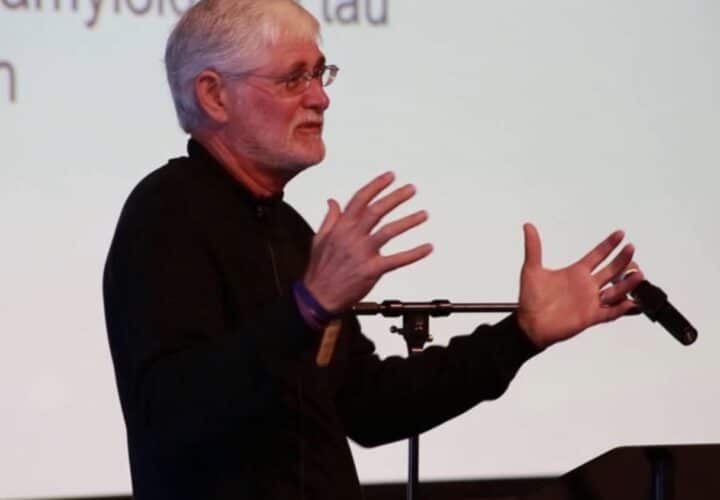
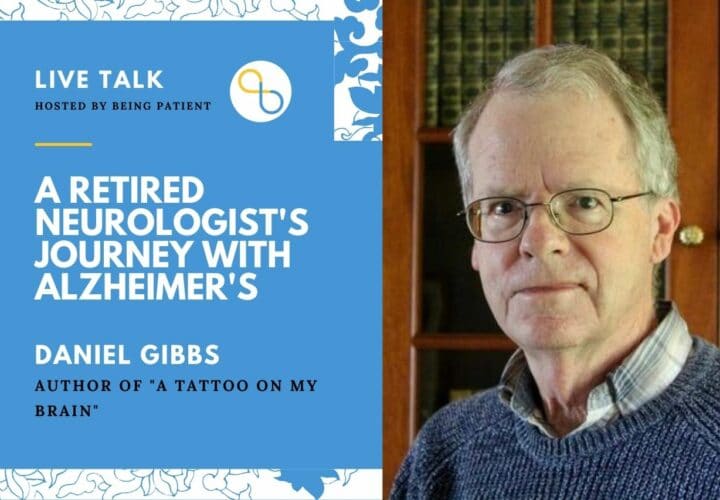
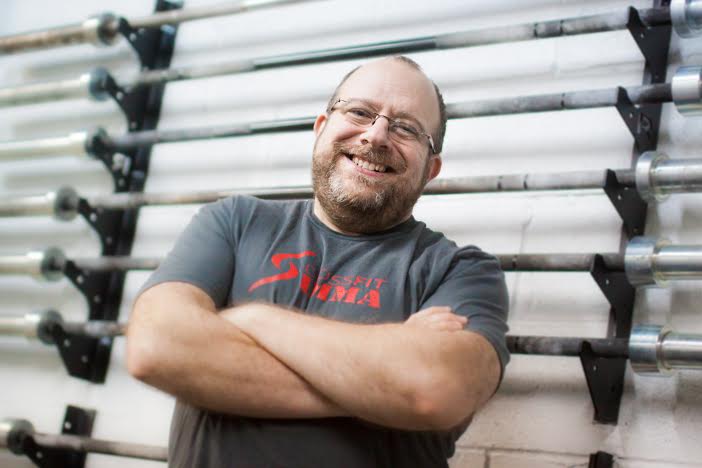
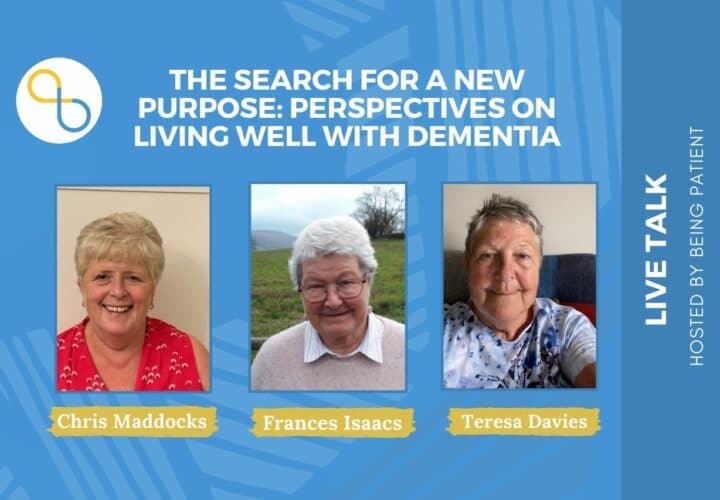
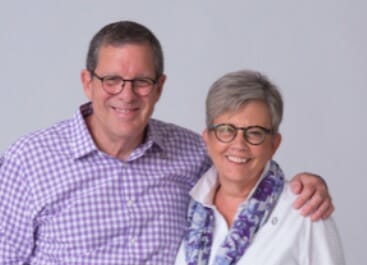
I think that’s what’s uniquely devastating about the disease,” said Jason Karlawish, a practicing physician and researcher who published. In fact, the FDA is requiring Biogen to conduct a clinical trial to validate whether reducing amyloid benefits patients.
Please Google “ My Voyage with Dementia”.
I have written almost 80 – 1000 word columns and had them published in a small local newspaper in the rurals of Southwestern Ontario, Canada.
My name is Bob Murray and I am 82 years old. I have MCI due to AD, an autoimmune disease, and today I found out that the melanoma that I had surgically removed 2 months ago has returned.
I am publishing a 180 page book based on my blog and will carry on as long as possible.
I do follow Being Patient and appreciate the work you do.
Cheers,
Bob